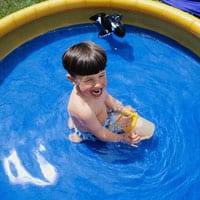A new study has found that portable pools may be more of a safety risk than many parents realize.
Related reading: Mother dies using pools slide
Researchers from the Center for Injury Research and Policy of The Research Institute at Nationwide Children’s Hospital found that every 5 days a child drowns in a portable pool during the summer in the United States. These pools include wading pools, inflatable pools and soft-sided, self-rising pools.
The majority of cases in the study, which looked at both fatal and non-fatal incidents, involved children under 5 years of age (94 percent), pools in the child’s own yard (73 percent) and occurred during the summer months (81 percent).
“Because portable pools are generally small, inexpensive and easy to use, parents often do not think about the potential dangers these pools present,” said Gary Smith, MD, DrPH, senior author of the study. “It only takes a couple of minutes and a few inches of water for a child to drown. It is important for parents to realize that portable pools can be just as dangerous as in-ground pools.”
While supervision by an adult when children are in a pool is important, it is not enough: More than 40 percent of the children in this study were being supervised by an adult at the time. In 18 percent of cases, a brief lapse in supervision, such as socializing with neighbors, answering the telephone and doing chores, was enough to allow an accident to occur.
Multiple layers of safety protection should be used to prevent portable pool drownings, including measures to prevent children from accessing pools when adults are not present, keeping children safe during use and being prepared to respond if an injury does occur.
“Drowning prevention tools used for in-ground pools are often either too expensive or simply not available for portable pools,” said Dr. Smith, also a professor of Pediatrics at The Ohio State University College of Medicine. “Portable pool manufacturers should develop more effective and affordable tools to help parents decrease the drowning hazards associated with these products.”
Also read: Tips on how to stay safe in a pool






Comments are closed.